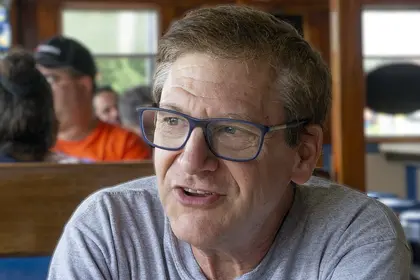One of the most widely used American Russian-language multi-media teaching materials, “Golosa,” will now record its Russian-language video segments in Kyiv.
The move comes as Russia’s political conditions and treatment of LGBT+ individuals have made it impossible for the academics to continue to produce the learning materials in Moscow.
JOIN US ON TELEGRAM
Follow our coverage of the war on the @Kyivpost_official.
“Golosa,” first printed in 1992, is a Russian language resource widely used in American universities and schools.
The text and accompanying tools are now in their 5th edition and have been updated numerous times to keep up to date with the rapidly changing post-Soviet world.
The lead author of the book, Dr. Richard Robin of George Washington University, an expert on Russian-language education and instruction, had originally recorded video segments for his book in Moscow.
The professor is a frequent guest on Russian opposition TV channels and lived and travelled extensively as a foreigner within the USSR. He concluded his last visit to Kyiv in 1980.
Filming includes basic interactions with members of the public, which are used to help students with their Russian-language comprehension.
A different Russia
Besides the practical difficulties of filming in Russia, such as the current spike in COVID-19 and current mandatory mask regulations, filming became impossible by the increasingly hostile social and political conditions.
“In Russia, it used to be pretty easy to talk to the manager of a store and say can I shoot your store…however now with all foreigners being suspect, that kind of conversation would probably not happen.”
“In Kyiv everything is very relaxed, and Americans are well received… no one is going to stop me and say: ‘no no don’t do that,’” the professor told our reporter.
The senior American lecturer has now started filming in both Kyiv and Odesa, speaking with business owners, members of the public, professionals, and officials.
Of the most pressing barriers to filming in Russia is the Kremlin’s regressive views on homosexuality and gay adoption. Out of fear for the safety of his colleagues, Robin decided to look for filming locations for the multimedia study materials.
“I have colleagues who are lesbians, who have adopted a child originally born in Russia,” Robin stated. “They used to take their child with them every summer. But then they decided, with the new anti-gay laws, and the anti-adoption procedures, that maybe it would be a good idea not to come to Russia.”
“Their adoption would be declared illegitimate, especially because they’re a gay couple. So we decided to seek other places where Russian is spoken,” the George Washington professor stated.
“One of my colleagues would like to able to return but feels unsafe because of her sexual orientation. In American academia, everyone is very open about their sexual identification.”
The Russian Language in Ukraine
Ukraine may not, on paper, be a likely choice for the interviews. There has been a concerted effort by the government to ditch Russian as an inter-ethnic lingua franca.
The Russian language remains widely spoken in Ukraine, however in the aftermath of the Maidan Revolution in 2014, both the Poroshenko and Zelensky governments have attempted to promote the use of the Ukrainian language in the public sphere.
“Russian seems to be spoken pretty freely. There seems to be a lot of pressure in the media to have everything in Ukrainian. I don’t see anything wrong with that. There’s nothing wrong with trying to make the language that was supposed to be the designated language of the country, the national language,” the professor said.
In Ukraine, most of the population profess Ukrainian to be their native tongue. According to a 2017 Razumkov Center poll, 67.7% of Ukrainians use Ukrainian as their first language, 17.4% mix Russian and Ukrainian, and 13.8% state that Russian is their first language.
According to a 2020 poll conducted by the Center for Social Monitoring, however, 36.3% of Ukrainians speak only Ukrainian, 10.3% speak only Russian, and 26.8% speak both languages equally often. In Kyiv, Russian is widely spoken.
The professor recognized that there were challenges to filming in Ukraine, which is sensitive to language issues, but pushed back against critics of Russian language education.
“I’m very sensitive to the notion of repressing original languages that people spoke. I understand the nationalistic urge to make one single language. A country should have a lingua franca, and Ukrainian now is that. But to repress people who want to speak their own language at home, I think that’s a bad idea.”
“All of the people I’m interviewing, they’re native Russian speakers. It’s not as if I have to look for Russian speakers here,” Dr. Robin stated.
A New, Inclusive Russian
In Kyiv, Russian is still used in some academia and formal settings. Many foreigners chose to study Russian at Ukrainian universities due to the difficulty of obtaining Russian visa and fears for their safety if they were to live in Russia.
The academics are now looking to make the 6th edition of their book more inclusive and diverse. The decision to film in Kyiv will be followed by incorporating audio clips and written passages from Central Asian Russian-users.
For Professor Robin, the move is not a reluctant decision, but rather highlights the dire political situation in Russia.
“I don’t need Russia to change it ways on my behalf so I can start shooting video, I don’t need him to stop oppressing people just for my video, I need to be assured that foreigners won’t be viewed as foreign agents trying to do damage to Russia. And I get that feeling now.”
You can also highlight the text and press Ctrl + Enter




